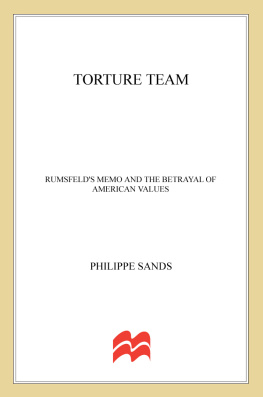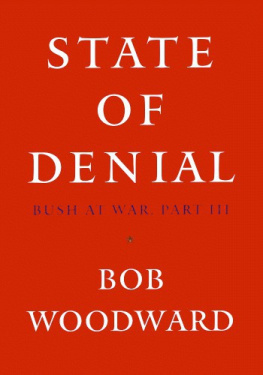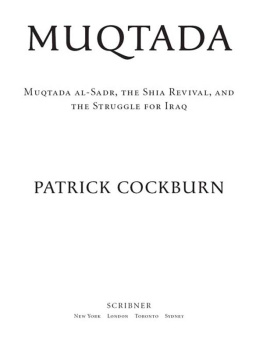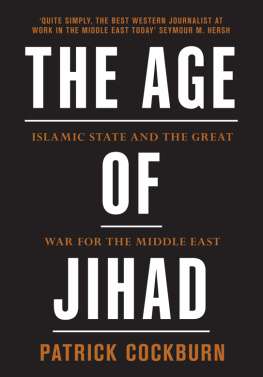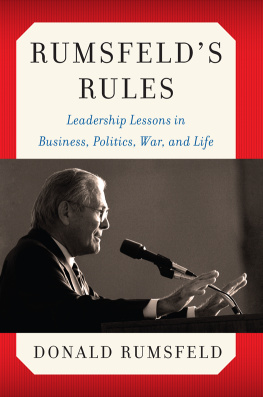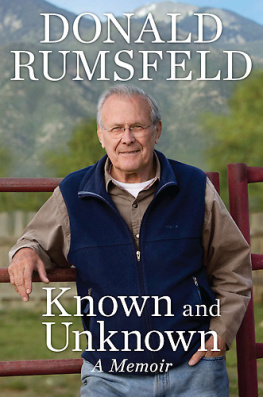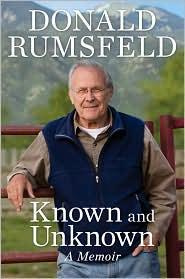A Division of Simon & Schuster, Inc.
All rights reserved, including the right to reproduce this book or portions thereof in any form whatsoever.
For information, address Scribner Subsidiary Rights Department, 1230 Avenue of the Americas, New York, NY 10020.
SCRIBNER and design are trademarks of Macmillan Library Reference USA, Inc., used under license by Simon & Schuster, the publisher of this work.
Library of Congress Cataloging-in-Publication Data is available.
Chapter One
Making History
Just after 9:37 a.m. on the morning of September 11, 2001, Officer Aubrey Davis of the Pentagon police was standing outside Donald Rumsfelds office on the third floor of the Pentagons E Ring. Inside, Rumsfeld, though aware that the World Trade Center towers in New York had already been hit, was proceeding with his regularly scheduled CIA briefing. Davis, on the other hand, had concluded from watching the TV news that the country was under attack and the Pentagon might be a target. Assigned to the defense secretarys personal bodyguard, he had come on his own initiative, ready to move Rumsfeld to a better-protected location.
There was an incredibly loud boom, says Davis, raising his voice slightly on the last word. Fifteen or twenty seconds later, just as his radio crackled with a message, the door opened and Rumsfeld walked out, looking composed and wearing the jacket he normally discarded while in his office. Sir, said Davis, quoting what he had heard on his radio, were getting a report that an airplane has hit the Mall.
The Mall? replied Rumsfeld calmly. Without further word, the secretary of defense turned on his heel and set off at a sharp pace toward the so-called Mall section of the Pentagon. Down the hall, someone ran out of a VIP dining room screaming, Theyre bombing the building, theyre bombing the building. Davis frantically waved for colleagues to catch up as the stocky, 5 8 defense secretary marched ahead of his lanky escort.
The group, which grew to include several more police officers as well as Rumsfelds personal communications aide, turned into the wide passageway running along the Mall face of the building. Thick crowds of Pentagon staff, in and out of uniform, were hurrying past in the opposite direction. They could smell smoke, but there was no sign of any damage here. I thought you said the Mall, said Rumsfeld.
Sir, responded Davis, holding his radio, now were hearing its by the heliport. This meant the next side of the building farther along from the Mall. Rumsfeld set off again without a word, ignoring Daviss protestations that they should turn back. At the end of the Mall corridor, we dropped down a stairway to the second floor, and then a little farther we dropped down to the first. It was dark and there was a lot of smoke. Then we saw daylight through a door that was hanging open. Groping through the darkness to the door, the group emerged outside. In front of them, just thirty yards away, roared a wall of flame.
There were the flames, and bits of metal all around, Davis remembers, as well as injured people. He noticed the white legs of a woman lying on the ground, then realized with a shock that she was African-American, horribly burned. The secretary picked up one of the pieces of metal. I was telling him he shouldnt be interfering with a crime scene when he looked at some inscription on it and said, American Airlines. Then someone shouted, Help, over here, and we ran over and helped push an injured person on a gurney over to the road.
While the secretary of defense was pushing a gurney, Daviss radio was crackling with frantic pleas from his control room regarding Rumsfelds whereabouts. It was Dr. Cambone [Rumsfelds closest aide] is asking, Dr. Cambone wants to find the secretary. I kept saying, Weve got him, but the system was overloaded, everyone on the frequency was talking, everything jumbled, so I couldnt get through and they went on asking.
An emergency worker approached, saying that equipment and medical supplies were needed. Tell this man what you need, said Rumsfeld, gesturing to the communications aide, apparently oblivious of the fact that there were no communications.
Once they had pushed the wounded man on the gurney over to the road, the bodyguard was finally able to lead his charge back inside the building. Id say we were gone fifteen minutes, max, he told me in his account of what happened that morning. Given the time it took to make their way down those Pentagon corridorseach side of the enormous building is the length of three football fieldsRumsfeld was actually at the crash site for only a fraction of that period.
Yet those few minutes made Rumsfeld famous, changed him from a half-forgotten twentieth-century political figure to Americas twenty-first-century warlord. On a day when the president was intermittently visible, only Rumsfeld, along with New York mayor Rudy Giuliani, gave the country an image of decisive, courageous leadership. According to his spokesman, the sixty-nine-year-old defense secretarys first instinct was to go out through the building to the crash site and help. Over time, the legend grew. One of the staffers in the office later assured me that Rumsfeld had torn his shirt into strips to make bandages for the wounded.
As we shall see, Rumsfeld was first and foremost a politician, though not always a successful one. The weeks before the attacks had been one of the unsuccessful phases, with rumors spreading in Washington that he would shortly be removed from his post. Only the day before he had lashed out at the Pentagon workforce, denouncing the assembled soldiers and civilians as a threat, a serious threat, to the security of the United States of America. Now, his instinctive dash to the crash site could inspire loyalty and support among those he had derided. An official in the Office of Plans, Analysis and Evaluation, whose office was close to Rumsfelds, saw him walking swiftly down the hall in the first minutes after the crash. Later, when he heard where Rumsfeld had been, he thought, very astute, politically.
Hatred and resentment among those in his wake had been a regular feature of Rumsfelds career, and 9/11 proved no exception. I first realized this while discussing that day with a senior WhiteHouse official who had been in the Situation Room, desperately trying to coordinate a response to the bewildering disaster of the attacks. As he reminisced, I mentioned that despite the legend, it didnt seem as if Rumsfeld could have had much time for rescue work that morning.
What was Rumsfeld doing on 9/11? said the former official with sudden anger. He deserted his post. He disappeared. The country was under attack. Where was the guy who controls Americas defense? Out of touch!
He wasnt gone for very long, I observed mildly.
My friend waved his coffee mug in emphatic rebuttal. How long does it take for something bad to happen? No one knew what was happening. What if this had been the opening shot of a coordinated attack by a hostile power? Outrageous, to abandon your responsibilities and go off and do what you dont need to be doing, grandstanding.



